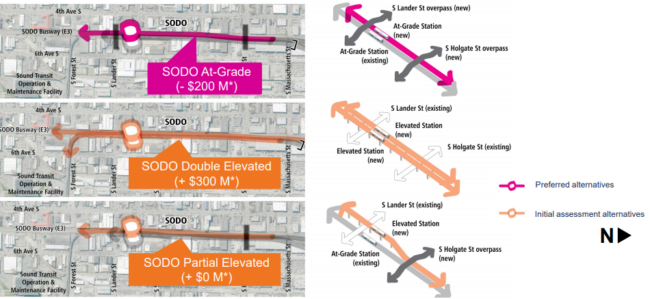Sound Transit Board resists adding Seattle rail options over cost concerns
 Link train crossing the Duwamish (Image: Mike Bjork/Flickr)
Link train crossing the Duwamish (Image: Mike Bjork/Flickr)Yesterday, the Sound Transit Board adopted a final set of options for the draft environmental impact statement (DEIS) for Link extensions to Ballard and West Seattle. After a contentious discussion that frequently focused on cost challenges, the Board voted down a Pigeon Point tunnel in West Seattle. Options for a central Ballard station at 20th Ave NW were not included in the DEIS either. Lacking support among board members, the central Ballard station was hardly discussed and it was not voted on.
Two options were added to the DEIS. As expected, the Board approved adding an alternative elevated alignment in the Yancy/Andover corridor area of West Seattle. That would reduce the number of homes to be taken for construction, but also shifts the Delridge station north with inferior station access.
At the meeting, the Board unanimously accepted an amendment to add a partial elevated option in SODO. The added option elevates the new line and stations, with the existing line at grade. It also retains the E3 busway which would disappear with a fully at-grade alignment. A fully at-grade option was among those adopted in May.
 In addition to the at grade option already in the DEIS, the Board added a partial elevated option, but rejected a double elevated alignment for the lines through SODO (image: Sound Transit)
In addition to the at grade option already in the DEIS, the Board added a partial elevated option, but rejected a double elevated alignment for the lines through SODO (image: Sound Transit)Both added options cost no more than the representative alignments. The four options not added after study all had added capital cost (and the Pigeon Point Tunnel would also delay delivering rail to West Seattle).

King County Council Member Joe McDermott offered an amendment to add a Pigeon Point tunnel, citing potential risks to the other alignments in the DEIS. The Pigeon Point tunnel has a direct cost impact of just $200 million, but requires $700 million tunnels to Avalon station. Even though the Avalon tunnels are in the DEIS options adopted in May, suburban board members mostly voted against adding a Pigeon Point tunnel to the DEIS. The motion failed 9-6.
There was virtually no Board discussion of Ballard, though several public commenters advocated for a 20th Ave NW station and others warned against impacts to the industrial areas east of 15th Ave. Seattle Mayor Jenny Durkan said she would not propose an amendment for 20th Ave options because it lacked the votes to pass. She thought the 20th Ave station would be very beneficial, and decried the lack of time for study. The FTA warned this month about Ballard options with in-water construction (both the fixed and movable bridges). She reiterated support for 15th over 14th because of the latter's proximity to industrial areas.
Despite the unwillingness yesterday to contemplate options that add cost, the Board had allowed options in May that require third party funding. Up to $1.7 billion of third party funding could be required depending on the option chosen. The Board required in May that any third party funding must be well-defined by end of 2020, and in place by mid-2022. In discussion yesterday, the "well-defined" 3rd party funding was clarified with an analogy to Bellevue. As part of East Link development, a term sheet identifying dollar contributions from City of Bellevue and sources of funding was created. These contributions were finalized after the EIS was completed within the memorandum of understanding (MOU).
Seattle's determination to postpone third party funding conversations to 2020 was resisted by other Board members, despite a vigorous defense by Joe McDermott. Pierce County Executive Bruce Dammeier pointed out he was at the end of the line in Pierce County and worried about adding costs to the system. The Board's priorities should be "ridership, cost and schedule" and any additional funding should go to where there would be new riders. Edmonds Mayor Dave Earling promised to vote against anything that required third party funding. Everett Council Member Paul Roberts described the additional options as not consistent with what the voters approved. They do not address or improve core priorities of the ST3 program, including completing the spine and adding ridership. University Place Mayor Kent Keel, referring to the $900 million total cost at Pigeon Point, said "my eyes roll in the back of my head when I think about that much money". King County Council Member Claudia Balducci argued a Pigeon Point tunnel option would "create expectations that .. we do not have a path to meet", and that West Seattle had an adequate number of alternatives for the DEIS.
Sound Transit is targeting a draft EIS by the end of 2020. With added alternatives, staff warned that may slip to the first quarter of 2021.